Dental Implants – Vero Beach, FL
Reliable Roots
for New Teeth
The big difference between traditional tooth replacements and real teeth is that normal prosthetics do not have roots. This means they’re generally not as strong or stable as your natural teeth, and they can’t be used to prevent bone loss. Dental implants change this, however, as they can fulfill the same functions as tooth roots, allowing them to set a new gold standard in replacing teeth. Call us today to schedule your initial consultation and learn more about the process of getting dental implants from our Vero Beach, FL dentist.
Why Choose Ocean Oaks Dental Group of Vero Beach for Dental Implants?
- Expert Dental Implant Planning
- Rapid Prototyping for Ideal Fit
- Fabricated On-Site for Ideal Color Matching
What Are Dental Implants?
A dental implant is a thin post shaped like a screw. Most dental implants are made out of titanium, but other biocompatible materials may be used based on the patient’s needs. What makes dental implants different is that they are placed in the jaw so that they can fuse with the bone; in other words, unlike bridges and dentures, implants can effectively become part of your body, making them feel and function more like real teeth.
The 4-Step Dental Implant Process
To rebuild your missing teeth from the roots up with dental implants, you’ll need to undergo a multi-step process—each stage being just as crucial as the one before to ensure a successful treatment. Our team will work closely with you at every phase of the journey. Here’s a brief look at the process of getting dental implants to restore your full smile.
Initial Dental Implant Consultation

The first step is the initial consultation where we examine your mouth and jaw to confirm whether you are currently healthy enough for dental implants or if certain preparations need to be made first. Of course, if you have any underlying issues such as gum disease, tooth decay, or insufficient jawbone density, then we’ll have to address them with services like periodontal treatment, bone grafting, or even tooth extractions if necessary. Once we’ve helped you return to great oral health, we can develop a detailed plan on how to rebuild your grin, including the type of restoration you’ll need and the overall cost of your care.
Dental Implant Surgery

At Ocean Oaks Dental Group of Vero Beach, we take a different approach to dental implant surgery. We leverage cutting edge technology with our implant surgical planning software and high-resolution CT scans to determine the optimal placement of the implant. In addition, we use medical grade 3D printers to fabricate surgical guides for precision placement of implants based on the ultimate restoration plan. At the start of your appointment, you’ll be given a local anesthetic to numb your mouth completely so that you are pain-free throughout the process. You may even be provided with sedation dentistry to help you stay entirely relaxed for a pleasant experience. Once you’re comfortable, your team will make an incision in your gums so that we can place the implants strategically in your jawbone. Dr. Josh will then suture the gums closed and place a protective layer over your metal posts so that they’re safe during recovery.
Dental Implant Osseointegration & Abutment

The following three to six months will be crucial for osseointegration—the bonding process between the dental implants and your jawbone. This is what will provide the stable and natural-feeling foundation for your permanent restoration, that way you won’t ever have to worry about your new teeth shifting out of place whenever you eat or talk. After your implants are properly healed, you’ll return to us to receive your abutments—small metal connectors that will link your restorations to your metal posts.
Delivery of Dental Implant Restoration(s)

Once your gums have completely recovered, you’ll come back to our office so we can place your final restorations according to the precision design process utilized before your surgery. Whether you get a dental crown, bridge, or denture, we’ll verify that your bite is correct and that you like the results of your treatment. If all is well and you’re satisfied, you’ll be set to head out and enjoy your full grin again! The Ocean Oaks Dental Group of Vero Beach difference is based on the precision planning approach that we use at the beginning of the process to ensure successful results. We leverage extensive technology to make certain that our implants deliver the optimal results!
Benefits of Dental Implants
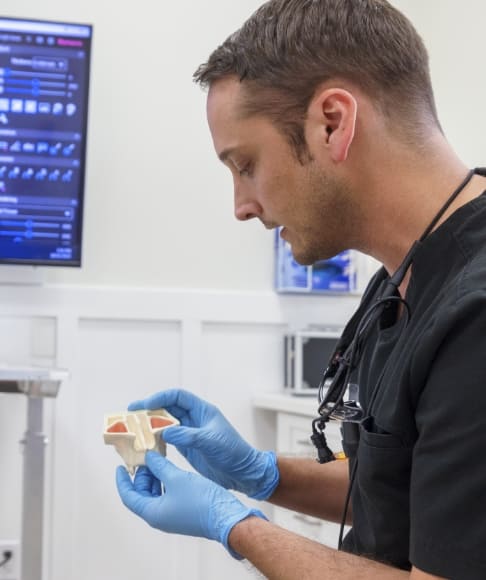
Millions of dental implants are placed in patients across the United States each year. What accounts for the skyrocketing popularity of this treatment? Simply put, dental implants offer more benefits than any other form of tooth replacement! They have the potential to improve your daily quality of life, support your oral and overall health, and provide advantages that last well into the future. Below, we explain some of the specific benefits that you may experience after the completion of your dental implant treatment.
Day-to-Day Benefits

Dental implants may improve your daily quality of life in a few important ways:
- Improved speech. A full set of teeth can allow you to clearly enunciate sounds and converse with confidence.
- A beautiful appearance. The implants and restorations that we make are designed to complement your facial features and look as natural as possible. No one may be able to tell that you have prosthetic teeth!
- Reliable function. Because implants anchor your artificial teeth in your jawbone, you will not have to worry about any embarrassing slips.
- Easy maintenance. Taking great care of your dental implants is not complex or difficult. In many ways, it is just like caring for natural teeth.
- After you adapt to them, dental implants and the restorations they support should feel like a natural extension of your body.
Health Benefits

Here are some examples of how dental implants can support your oral health and overall wellness:
- Prevent dental drift. Implants can act as placeholders that prevent your remaining natural teeth from drifting out of place.
- Jawbone preservation. Because dental implants stimulate the jawbone, they can prevent the deterioration that normally occurs after the natural teeth are extracted.
- Improved nutrition. Dental implants can enable you to eat virtually any food, including raw fruits and veggies, a wide variety of proteins, and more. A well-balanced diet can help you feel good on a daily basis and reduce your risk of numerous diseases.
- No gum sores. Unlike traditional dentures, implants and their restorations are unlikely to cause gum irritation and sores.
- Improved emotional and mental wellness. Dental implants may support your confidence in social situations, so you can enjoy meaningful and healthy interactions with other people.
Long-Term Benefits

Dental implants are truly a long-term tooth replacement solution.
- Lasting results. With proper care, your dental implants may last for the rest of your life. The restorations on top of them may also endure for quite a while.
- Monetary value. Even though dental implants cost more upfront than other types of tooth replacement, they are an excellent value! In fact, their cost per day over the course of a few decades may be less than a daily trip to your favorite espresso shop!
- A longer lifespan. Did you know that extensive tooth loss is correlated with a reduced life expectancy? Dental implants can reverse the worst effects of missing teeth and support your overall wellness deep into your senior years.
Who Can Dental Implants Help?

Are dental implants right for you? In most cases, they probably are, but we do need to make sure that you qualify for the treatment. That means having a jawbone capable of supporting the implants, a mouth that is free of gum disease, and overall health that will allow you to undergo implant surgery. Once we’ve determined that you can receive implants, we can start discussing the number of implant posts you’ll need and the type of restoration they’ll support.
Missing Single Tooth

Obviously, a single missing tooth only requires one implant to replace it. It will take a matter of months for the implant post to join with the jawbone; once it has, a dental crown can be made in our dental lab based on an impression of your fully healed mouth.
Missing Multiple Teeth

Dental bridges can replace three or more teeth in a row, and they usually only require two dental implants for support. Normally, bridges are placed on natural teeth, but using dental implants instead lets you keep the enamel on your natural teeth fully intact while still enjoying the benefits of stable new teeth.
Missing All Teeth

People who are frustrated with traditional dentures that don’t seem to stay in place may want to think about switching to implant dentures. Around 4 to 6 implant posts are usually employed to support an entire arch of teeth. By getting dentures that are permanently attached to the posts, you can enjoy a stability that is much more similar to real teeth.
Understanding the Cost of Dental Implants

Unlike buying a product off the shelf at a store, the amount you end up paying for dental implants is not set in stone. In fact, it can vary quite a bit depending on the situation. A patient receiving a single dental implant immediately after an extraction can expect a different price than a patient that requires multiple implants and a bone graft. We will discuss these variables with you during your first consultation and explain why dental implants are worth the investment in the long run.
Preliminary Treatments & Dental Implant Surgery
In some cases, extra work must be done before implant treatment can begin. For instance, if you need a bone graft, gum disease treatment, or additional extractions, these procedures will add to the overall cost. In addition, the cost will increase as the number of dental implants goes up. As we strategize your tooth replacement, we will do our best to use the least number of implants that are necessary to hold your prosthetic teeth in place.
The Parts of Your Dental Implant
Just as there are different brands of cars and home appliances, there are different brands of dental implants that come with their own list of features. Depending on your needs, we will select the parts that will suit your smile and give you the results you need for the long term.
How Dental Implants Pay for Themselves
When you look at the initial cost of tooth replacements, dental implants obviously come at the highest price. However, when you choose traditional dentures or bridges, you have to factor in subsequent costs. Dentures must be relined every couple of years and replaced every 5 to 7 years, and bridges must be replaced about every 10 years. In contrast, dental implants commonly last longer than 20 years or longer. When you look at the big picture and consider all the benefits they offer, dental implants can clearly become the smarter choice.
Does My Dental Insurance Cover Dental Implants?
In general, dental insurance plans rarely include coverage for dental implants. However, some policies will cover certain preliminary procedures, such as an extraction or even bone graft. Plus, the cost of the restoration may be partially covered. Keep in mind that the total cost will be due at time of service, but we can give you all the documentation you need to file for reimbursement.
Dental Implant Technology
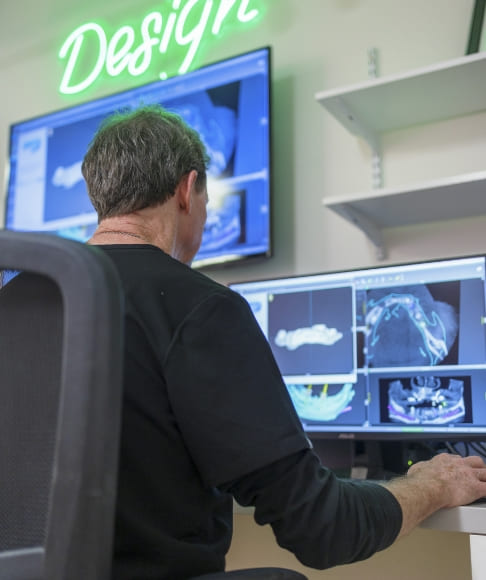
Dental implants are designed to last for several decades, and the first component of achieving this goal is the procedure itself. To ensure the process is as efficient, accurate, and comfortable as possible for our patients in Vero Beach, we utilize the latest dental implant technology and work directly with our talented lab technicians. If you’d like to learn about the former, then keep reading!
3D Cone Beam Imaging/3D CT Scanning
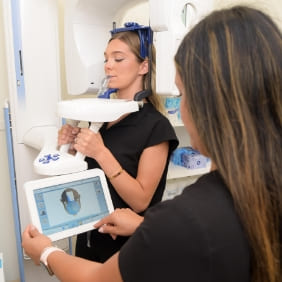
Since oral structures (like the roots of your teeth) are hidden, there are important components of the procedure that would be missed with a visual exam alone. Although digital X-rays provide much more insight, they don’t capture everything. Fortunately, that’s where 3D cone beam imaging/3D CT scanning comes in. With this technology, we can see nerve pathways, the thickness of the jawbone, blood vessels, and more. This information ensures we can plan out your dental implant procedure as precisely as possible, increasing the chances of its long-term success.
Custom 3D Printed Dental Implant Surgical Guides
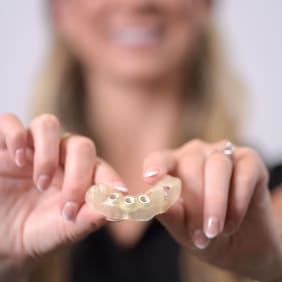
While we do not place dental implants in Vero Beach ourselves, we do play a role in planning the procedure. With 3D imaging, we can create custom surgical guides based on virtual models of your teeth. Showing exactly where the implants need to be inserted helps the surgeon avoid complications such as damaging unseen nerves around the surgical site. We only work with surgeons that agree to use our custom guides to ensure the best possible results for our patients.
Digital Impression System with Intraoral Scanner
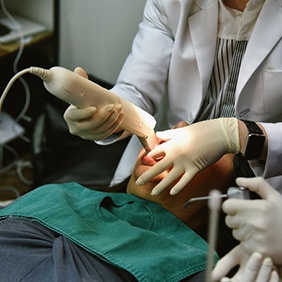
Dental implants are well-known for being extremely lifelike in look and feel. That’s because they are custom-made with your specific dental needs and smile goals in mind! Previously, this involved the use of putty impressions, which often made patients feel like they were having trouble breathing. Thankfully, there is now an alternative: digital impressions with an intraoral scanner. With this device, we can quickly scan your teeth and create a detailed rendering of your bite. From there, we can make sure your crown, bridge, or denture fits perfectly and looks gorgeous.
Computer-Aided Design & Milling (CAD/CAM)
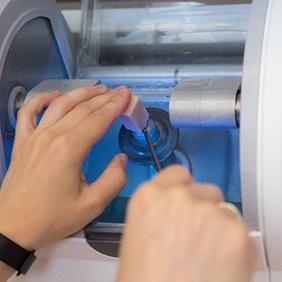
Computer-Aided Design & Milling, commonly referred to as CAD/CAM, is a software that allows implant dentists to perform complex restorations with a higher degree of accuracy (and significantly faster!). This results in several benefits for our patients in Vero Beach, including fewer disruptions to your schedule. If you’d like to learn more about this technology, or any of the previously mentioned ones, get in touch with our team today.
Maintaining & Caring for Your Dental Implants

Dental implants have an incredible success rate of over 95%! This means that a dental implant failure is highly unlikely. However, it’s still important that you take all the proper steps to keep your implants in excellent shape. Continue reading to learn which steps and healthy habits you should be taking to maintain and care for your newly restored smile.
Make Oral Hygiene a Priority

Dental implants are not susceptible to cavities, but the teeth surrounding them are! Your gums are also at risk of becoming infected. You should continue to maintain an excellent oral hygiene regimen. Remember to brush twice, floss, and rinse with mouthwash every day.
Eat a Healthy Diet

One of the great benefits of dental implants is the fact that patients can enjoy a complete and nutritious diet. This is certainly something to take advantage of. Just remember that you should avoid indulging in foods that are particularly hard, sticky, or sugary. Instead, enjoy plenty of foods that are high in calcium and vitamin C. These nutrients help to maintain the health of your jaw and gums.
Break Bad Habits

Bad habits can cause major issues for your teeth and dental implants if you don’t put a stop to them. It is always best to refrain from smoking cigarettes and using other tobacco products. These can slow healing and make it more challenging for your immune system to fight off infections throughout your body. You should also avoid using your teeth to open bottles, rip through packaging, or complete other tasks. Instead, find an appropriate tool so you don’t hurt your smile.
Protect Your Dental Implants

Dental implants are very resilient and can last for many years. However, you should still wear a mouthguard when engaging in contact sports. If you tend to grind your teeth at night, you may want to ask your dentist about getting a nightguard to protect your replacement teeth (and natural teeth) from too much wear and tear.
Schedule Regular Dental Checkups

You should continue to attend regular cleanings and checkups twice each year. This way, we can monitor your dental implants, natural teeth, gum tissue, and more. By detecting issues early on, we can address them quickly and may even be able to prevent serious issues from arising later on.
Dental Implant Post-Op Instructions

After you undergo dental implant placement surgery, you will have to go through a recovery period. That might seem intimidating, but it is really nothing to worry about! In fact, the entire process is easier than most people expect. Below, we walk you through what you may experience as you are healing, and we provide tips that will minimize your risk of post-op complications.
What to Do Directly After Dental Implant Surgery

After your surgery, blood clots should start to form at your surgical sites. These are a key part of your body’s healing process, so you should take steps to protect them. For example, you should:
- Avoid the use of drinking straws.
- Do not smoke or chew tobacco.
- Do not spit vigorously. Instead, swallow extra saliva or use tissues to absorb it.
- Do not touch your surgical sites with your tongue or fingers.
Common Side Effects When Recovering from Dental Implant Placement

In the days after your surgery, you might experience:
- Intermittent bleeding. Gauze and light pressure can keep this under control. The bleeding may continue for several days.
- Swelling. This may continue over the first 72 hours and last for a week or longer. Cold compresses can minimize it.
- General discomfort. You should be sure to get plenty of rest and take pain medication if necessary.
If you experience any severe or unusual side effects, you should call our team right away to request assistance.
Your Diet After Dental Implant Surgery

At first, you may need to eat a no-chew diet, which can include liquids and very soft foods, such as mashed potatoes, yogurt, pudding, and brothy soups. As you heal, you may graduate to fork-tender foods (anything that is easy to cut with the side of a fork), such as meatloaf and scrambled eggs.
If you still have some of your natural teeth, you can resume a fairly normal diet when you feel up to it. However, you should still be cautious around your implant sites. If you do not have any of your natural teeth left, you may need to stick to a soft diet until your restorations are in place.
Post-Op Health & Oral Hygiene

You can brush your teeth the day after your surgery, but you should be very cautious around your implant sites. If you use mouthwash, avoid products with high levels of alcohol. You can also rinse with warm salt water a few times each day to minimize inflammation and fight oral bacteria.
What to Do After Your New Teeth Are Attached

After we attach your new crown, bridge, or denture to your dental implant sites, you will not have to go through any downtime. Although you might experience some temporary sensitivity in your gum tissue, you should be able to leap right back into your normal routine. Our team will give you personalized tips to help you adapt to your new smile.
Dental Implant FAQs
Can I Take Dental Implants Out?
No, you cannot remove dental implants because they are designed to provide a lifelong solution for missing teeth. A dental implant is unlike any other treatment because it replicates both the root and the crown. A titanium post is surgically placed into your jaw to mimic a root to provide your restoration with unmatched support and stability. Your jaw will fuse to the implant, so only a trained dental professional can take it out, such as in cases of failure. Although you can't remove your post, some implant dentures are removable for easy cleaning.
Does It Hurt to Get Dental Implants?
Your implant dentist in Vero Beach will keep your comfort as their top priority. You won't feel anything during your implant surgery because sedation or anesthesia will block any pain. However, it's normal for your mouth to be sore for a few days after the effects of any sedatives or numbing agents dissipate. You can manage your discomfort by taking an over-the-counter or prescribed pain reliever. Applying a cold compress can numb the area while also reducing bruising and swelling. Follow your dentist's dietary instructions and any additional recovery recommendations to ensure there aren't any delays in your healing.
How Long Do Dental Implants Last?
Dental implants can last for a lifetime, but many factors affect their life expectancy. It's not unusual for them to last for 30 years or longer, depending on how well you care for your new smile. Brushing, flossing, and using a daily mouthwash will ensure your dental implants last for decades. It's best to break any bad habits, like smoking, chewing on your fingernails, or using your teeth as tools to prevent any unnecessary complications. Besides caring for your smile at home, visit your dentist every six months for a cleaning and checkup.
What are the Signs of Dental Implant Failure?
Although the risk of dental implant failure is less than 5%, it's important to be vigilant for any signs of a problem, like red, swollen, or bleeding gums. They are symptoms of an infection called peri-implantitis, which is like gum disease. Despite being preventable, it is a leading cause of dental implant failure. Don't wait to contact our office if you notice any changes to your oral health. Quick detection and treatment are essential for safeguarding your investment. If you have any pain near the implant or it feels loose, contact our office immediately.
